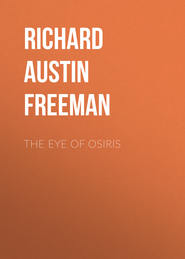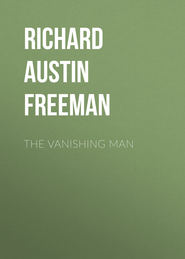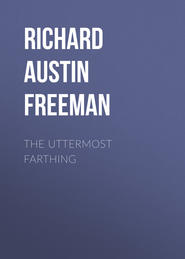По всем вопросам обращайтесь на: info@litportal.ru
(©) 2003-2024.
✖
The Red Thumb Mark
Настройки чтения
Размер шрифта
Высота строк
Поля
"Yes," I answered. "The uncleanness of the criminal is not confined to his moral being; wherever he goes, he leaves a trail of actual, physical dirt. It is not so long ago that the dock and the bench alike used to be strewn with medicinal herbs, and I believe the custom still survives of furnishing the judge with a nosegay as a preventive of jail-fever."
"And to think that Reuben should be brought to a place like this!" Juliet continued bitterly; "to be herded with such people as we saw downstairs!"
She sighed and looked round at the benches that rose behind us, where a half-dozen reporters were already seated and apparently in high spirits at the prospect of a sensational case.
Our conversation was now interrupted by the clatter of feet on the gallery stairs, and heads began to appear over the wooden parapet. Several junior counsel filed into the seats in front of us; Mr. Lawley and his clerk entered the attorney's bench; the ushers took their stand below the jury-box; a police officer seated himself at a desk in the dock; and inspectors, detectives and miscellaneous officers began to gather in the entries or peer into the court through the small glazed openings in the doors.
CHAPTER XV
THE FINGER-PRINT EXPERTS
The hum of conversation that had been gradually increasing as the court filled suddenly ceased. A door at the back of the dais was flung open; counsel, solicitors, and spectators alike rose to their feet; and the judge entered, closely followed by the Lord Mayor, the sheriff, and various civic magnates, all picturesque and gorgeous in their robes and chains of office. The Clerk of Arraigns took his place behind his table under the dais; the counsel suspended their conversation and fingered their briefs; and, as the judge took his seat, lawyers, officials, and spectators took their seats, and all eyes were turned towards the dock.
A few moments later Reuben Hornby appeared in the enclosure in company with a warder, the two rising, apparently, from the bowels of the earth, and, stepping forward to the bar, stood with a calm and self-possessed demeanour, glancing somewhat curiously around the court. For an instant his eye rested upon the group of friends and well-wishers seated behind the counsel, and the faintest trace of a smile appeared on his face; but immediately he turned his eyes away and never again throughout the trial looked in our direction.
The Clerk of Arraigns now rose and, reading from the indictment which lay before him on the table, addressed the prisoner—
"Reuben Hornby, you stand indicted for that you did, on the ninth or tenth day of March, feloniously steal a parcel of diamonds of the goods and chattels of John Hornby. Are you guilty or not guilty?"
"Not guilty," replied Reuben.
The Clerk of Arraigns, having noted the prisoner's reply, then proceeded—
"The gentlemen whose names are about to be called will form the jury who are to try you. If you wish to object to any of them, you must do so as each comes to the book to be sworn, and before he is sworn. You will then be heard."
In acknowledgment of this address, which was delivered in clear, ringing tones, and with remarkable distinctness, Reuben bowed to the clerk, and the process of swearing-in the jury was commenced, while the counsel opened their briefs and the judge conversed facetiously with an official in a fur robe and a massive neck chain.
Very strange, to unaccustomed eyes and ears, was the effect of this function—half solemn and half grotesque, with an effect intermediate between that of a religious rite and that of a comic opera. Above the half-suppressed hum of conversation the clerk's voice arose at regular intervals, calling out the name of one of the jurymen, and, as its owner stood up, the court usher, black-gowned and sacerdotal of aspect, advanced and proffered the book. Then, as the juryman took the volume in his hand, the voice of the usher resounded through the court like that of a priest intoning some refrain or antiphon—an effect that was increased by the rhythmical and archaic character of the formula—
"Samuel Seppings!"
A stolid-looking working-man rose and, taking the Testament in his hand, stood regarding the usher while that official sang out in a solemn monotone—
"You shall well and truly try and true deliverance make between our Sovereign Lord the King and the prisoner at the bar, whom you shall have in charge, and a true verdict give according to the evidence. So help you God!"
"James Piper!" Another juryman rose and was given the Book to hold; and again the monotonous sing-song arose—
"You shall well and truly try and true deliverance make, etc."
"I shall scream aloud if that horrible chant goes on much longer," Juliet whispered. "Why don't they all swear at once and have done with it?"
"That would not meet the requirements," I answered. "However, there are only two more, so you must have patience."
"And you will have patience with me, too, won't you? I am horribly frightened. It is all so solemn and dreadful."
"You must try to keep up your courage until Dr. Thorndyke has given his evidence," I said. "Remember that, until he has spoken, everything is against Reuben; so be prepared."
"I will try," she answered meekly; "but I can't help being terrified."
The last of the jurymen was at length sworn, and when the clerk had once more called out the names one by one, the usher counting loudly as each man answered to his name, the latter officer turned to the Court and spectators, and proclaimed in solemn tones—
"If anyone can inform my Lords the King's justices, the King's attorney-general, or the King's serjeant, ere this inquest be now taken between our Sovereign Lord the King and the prisoner at the bar, of any treason, murder, felony or misdemeanour, committed or done by him, let him come forth and he shall be heard; for the prisoner stands at the bar upon his deliverance."
This proclamation was followed by a profound silence, and after a brief interval the Clerk of Arraigns turned towards the jury and addressed them collectively—
"Gentlemen of the jury, the prisoner at the bar stands indicted by the name of Reuben Hornby, for that he, on the ninth or tenth of March, feloniously did steal, take and carry away a parcel of diamonds of the goods of John Hornby. To this indictment he has pleaded that he is not guilty, and your charge is to inquire whether he be guilty or not and to hearken to the evidence."
When he had finished his address the clerk sat down, and the judge, a thin-faced, hollow-eyed elderly man, with bushy grey eyebrows and a very large nose, looked attentively at Reuben for some moments over the tops of his gold-rimmed pince-nez. Then he turned towards the counsel nearest the bench and bowed slightly.
The barrister bowed in return and rose, and for the first time I obtained a complete view of Sir Hector Trumpler, K.C., the counsel for the prosecution. His appearance was not prepossessing nor—though he was a large man and somewhat florid as to his countenance—particularly striking, except for a general air of untidiness. His gown was slipping off one shoulder, his wig was perceptibly awry, and his pince-nez threatened every moment to drop from his nose.
"The case that I have to present to you, my lord and gentlemen of the jury," he began in a clear, though unmusical voice, "is one the like of which is but too often met with in this court. It is one in which we shall see unbounded trust met by treacherous deceit, in which we shall see countless benefactions rewarded by the basest ingratitude, and in which we shall witness the deliberate renunciation of a life of honourable effort in favour of the tortuous and precarious ways of the criminal. The facts of the case are briefly as follows: The prosecutor in this case—most unwilling prosecutor, gentlemen—is Mr. John Hornby, who is a metallurgist and dealer in precious metals. Mr. Hornby has two nephews, the orphan sons of his two elder brothers, and I may tell you that since the decease of their parents he has acted the part of a father to both of them. One of these nephews is Mr. Walter Hornby, and the other is Reuben Hornby, the prisoner at the bar. Both of these nephews were received by Mr. Hornby into his business with a view to their succeeding him when he should retire, and both, I need not say, occupied positions of trust and responsibility.
"Now, on the evening of the ninth of March there was delivered to Mr. Hornby a parcel of rough diamonds of which one of his clients asked him to take charge pending their transfer to the brokers. I need not burden you with irrelevant details concerning this transaction. It will suffice to say that the diamonds, which were of the aggregate value of about thirty thousand pounds, were delivered to him, and the unopened package deposited by him in his safe, together with a slip of paper on which he had written in pencil a memorandum of the circumstances. This was on the evening of the ninth of March, as I have said. Having deposited the parcel, Mr. Hornby locked the safe, and shortly afterwards left the premises and went home, taking the keys with him.
"On the following morning, when he unlocked the safe, he perceived with astonishment and dismay that the parcel of diamonds had vanished. The slip of paper, however, lay at the bottom of the safe, and on picking it up Mr. Hornby perceived that it bore a smear of blood, and in addition, the distinct impression of a human thumb. On this he closed and locked the safe and sent a note to the police station, in response to which a very intelligent officer—Inspector Sanderson—came and made a preliminary examination. I need not follow the case further, since the details will appear in the evidence, but I may tell you that, in effect, it has been made clear, beyond all doubt, that the thumb-print on that paper was the thumb-print of the prisoner, Reuben Hornby."
He paused to adjust his glasses, which were in the very act of falling from his nose, and hitch up his gown, while he took a leisurely survey of the jury, as though he were estimating their impressionability. At this moment I observed Walter Hornby enter the court and take up a position at the end of our bench nearest the door; and, immediately after, Superintendent Miller came in and seated himself on one of the benches opposite.
"The first witness whom I shall call," said Sir Hector Trumpler, "is John Hornby."
Mr. Hornby, looking wild and agitated, stepped into the witness-box, and the usher, having handed him the Testament, sang out—
"The evidence you shall give to the court and jury sworn, between our Sovereign Lord the King and the prisoner at the bar shall be the truth, the whole truth, and nothing but the truth; so help you God!"
Mr. Hornby kissed the Book, and, casting a glance of unutterable misery at his nephew, turned towards the counsel.
"Your name is John Hornby, is it not?" asked Sir Hector.
"It is."
"And you occupy premises in St. Mary Axe?"
"Yes. I am a dealer in precious metals, but my business consists principally in the assaying of samples of ore and quartz and bars of silver and gold."
"Do you remember what happened on the ninth of March last?"
"Perfectly. My nephew Reuben—the prisoner—delivered to me a parcel of diamonds which he had received from the purser of the Elmina Castle, to whom I had sent him as my confidential agent. I had intended to deposit the diamonds with my banker, but when the prisoner arrived at my office, the banks were already closed, so I had to put the parcel, for the night, in my own safe. I may say that the prisoner was not in any way responsible for the delay."
"You are not here to defend the prisoner," said Sir Hector. "Answer my questions and make no comments, if you please. Was anyone present when you placed the diamonds in the safe?"
"No one was present but myself."
"I did not ask if you were present when you put them in," said Sir Hector (whereupon the spectators sniggered and the judge smiled indulgently). "What else did you do?"
"I wrote in pencil on a leaf of my pocket memorandum block, 'Handed in by Reuben at 7.3 p.m., 9.3.01,' and initialled it. Then I tore the leaf from the block and laid it on the parcel, after which I closed the safe and locked it."
"How soon did you leave the premises after this?"









